#Hong Kong diaspora
Explore tagged Tumblr posts
Text
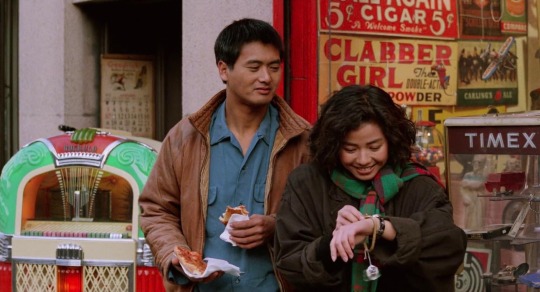
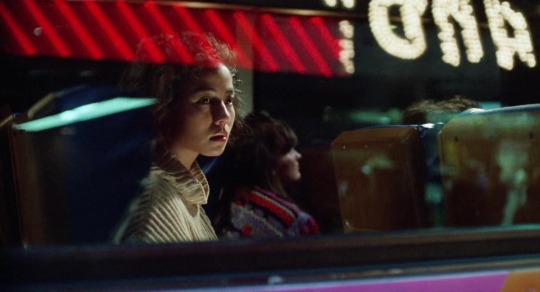
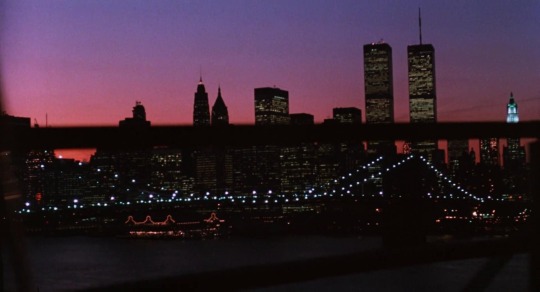
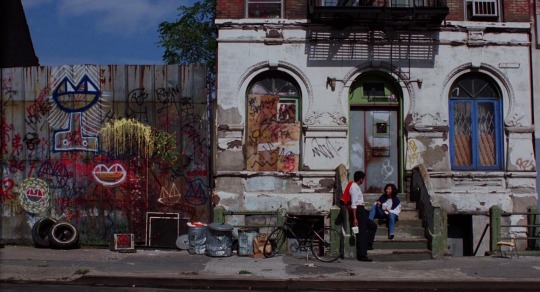
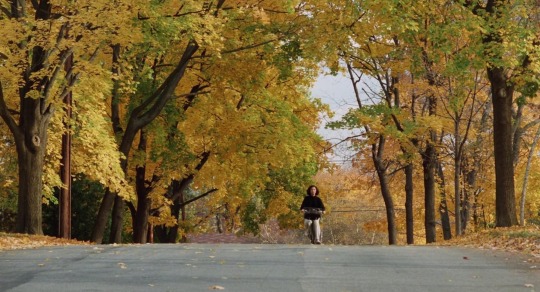
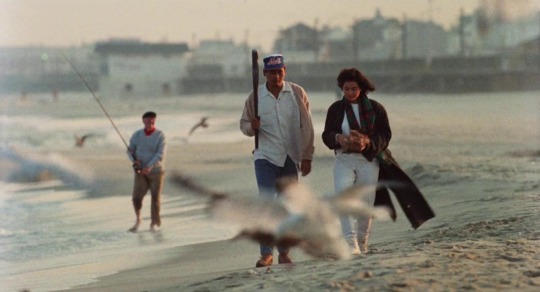
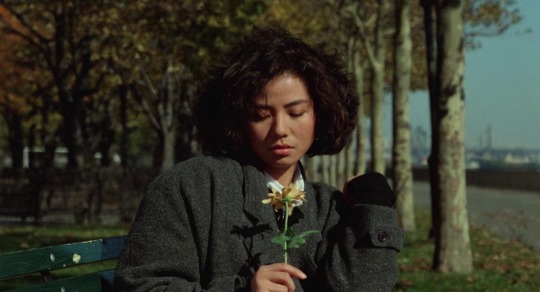
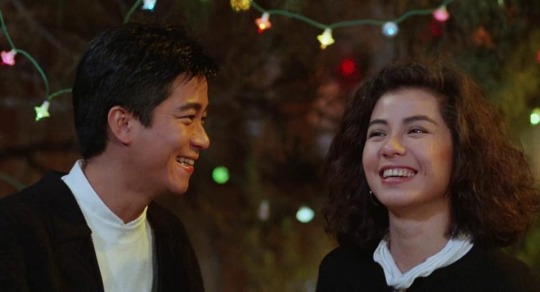
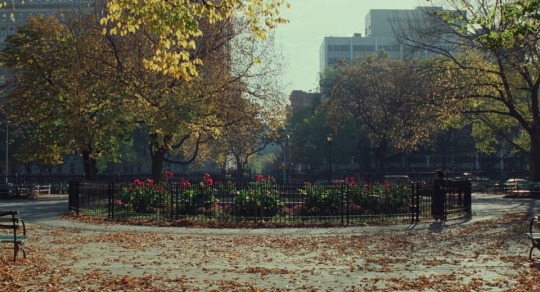
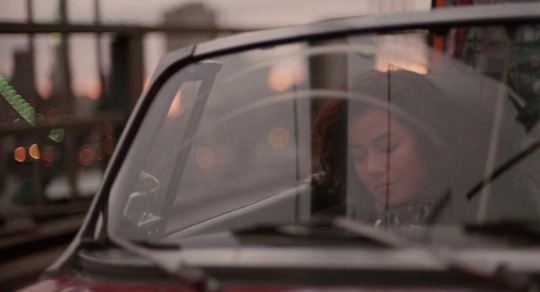
An Autumn’s Tale (1987)
Dir. Mabel Cheung
#an autumns tale#film#movie#cinema#mabel cheung#chow yun fat#Cherie chung#danny chan bak keung#gigi wong#Asian cinema#hong Kong#drama#romance#asian diaspora#new york#nyc#new york city#autumn#fall#hong kong cinema
24 notes
·
View notes
Text
youtube
Former Hong Kong bookstore begins new chapter in upstate New York, July 30, 2024
From 2021 to 2022, Hong Kong experienced its biggest population drop since record-keeping began more than 60 years ago. Tens of thousands left because of strict COVID-19 policies and a crackdown on civil liberties by Beijing. Special correspondent Christopher Booker spent time with an American couple part of this exodus and reports on their journey for our arts and culture series, CANVAS. PBS NewsHour
#diaspora#books#Hong Kong#hong kong national security law#article 23#antiELAB#pandemic#protest#censorship#political repression#Bleak House Books#Albert Wan#Jenny Smith#art#civil liberties#politics#pbs newshour#freedom of the press#extradition#freedom of association#freedom of speech#Youtube
2 notes
·
View notes
Text
This ending to “Comrade: Almost a Love Story” (1996) hits as hard as it did more than two decades ago. Hopeful and poignant, it was the perfect ending 👏🏽
The movie is so, so fabulous ⭐️
An oldie favourite, I am struck anew by how stunning and accomplished Maggie Cheung is 🌸🤩👏🏽
youtube
#甜蜜蜜
#Hong Kong movie#Peter Chan#maggie cheung#leon lai#Comrade: Almost a Love Story#甜蜜蜜#cantonese#homage to Teresa Teng and her pop culture influence#a beautiful and ‘real’ love story#Cantonese movie#a love story#mandarin#stories about migrants and the Chinese diaspora#this is a story about many things#which is what made it complex and fascinating#about 1980s and 1990s Hong Kong#it has depth#an almost love story but also more than that#Youtube#Maggie Cheung’s performance was perfect#張曼玉#time capsule of a movie
3 notes
·
View notes
Text
If anyone from Hong Kong or speaks Cantonese sees this I would love it if You could reply and give me some notes on names I’ve chosen, and also if the familial terms I’ve found are correct!
Yeung Jyun-Fa — using the characters for ‘poplar’, ‘to wish’, and ‘flower’, I wanted to make a name that meant ‘the poplar wishing for/awaiting flowers’ as a nod to the story’s themes.
Yeung Tai-Song — using the characters for ‘poplar’, ‘to weep aloud/cry’, and ‘to kowtow’, I’m trying to make a name that means ‘the poplar weeps and kowtows’ as foreshadowing to the character’s arc.
Sai loh — I have been told this is a colloquial terms for ‘little brother’.
Sai mui — the same for ‘little sister’.
Sing-si — the term for the family name’s Chinese character.
Is this all correct?? And further more would these romanizations be appropriate approximations for a story written in english?
6 notes
·
View notes
Quote
So, I do not include any official pronunciation, but represent the Cantonese diaspora of imperfect, incorrect but widespread pronunciations, clownishly embarrassing noun replacements, for the Full Diaspora Experience.
Lucy dan
1 note
·
View note
Text
Hi! So I just felt the need to clarify the distinction between "Macanese" and "Macau person/native person from Macau", since the wording in the post might imply that those are interchangeable. (There were attempts to make them interchangeable by the government, but the wording of the post points otherwise.)
The Macanese (Cantonese: 土生葡人 or 麥境士) are a distinct multiracial ethnic group within Macau, which as the post said, have Portuguese and Chinese heritage (but also genetic traces such as Malay, Indian or even Japanese influences). They have their own (endangered) Portuguese-based creole called Patuá (which has Cantonese Malay and Sinhala influences), though almost all of them can speak Cantonese, and most know English and historically Portuguese. A lot of them are culturally Catholic. Here's a very short video about Patuá:
youtube
The average person in Macau on the other hand, is not Macanese, but instead a Macau person (澳門人). They speak Cantonese, usually consider themselves Cantonese, and typically do not culturally align themselves with Portugal.
There were attempts in 90s during the late Portuguese colonial years to redefine "Macanese" to refer to all people from Macau regardless of ethnicity, but that risks making people assume all people from Macau share the same Portuguese-Asian Creole ethnicity, or risks erasing the long cultural legacy of the Macanese ethnic group. So, I thought I'd chime in.
Day 205
Today’s Asian character is Lea Bing from Barbie!
She is Macanese.
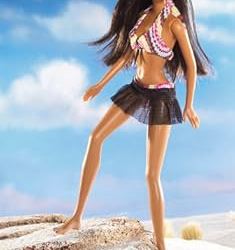
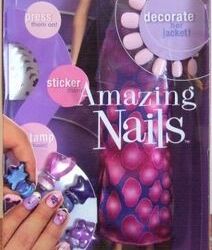
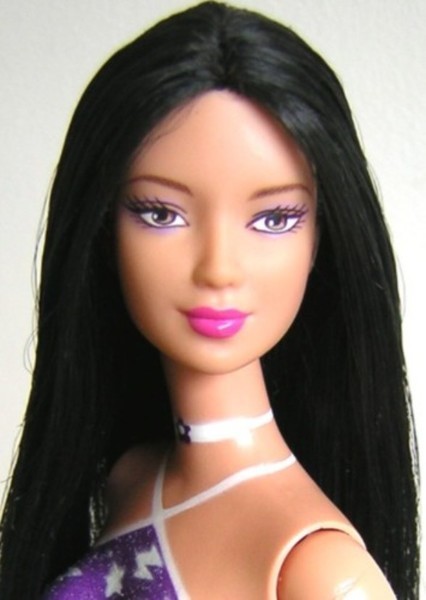
(Thanks to the person who suggested her! In case ya’ll didn’t know, Macau is an administrative district in China, but is considered its own ethnicity due to Macanese being a mix of Portuguese and Chinese blood!)
#disclaimer: I am NOT from Macau#nor am i Macanese#i am a hongkonger who just so happened to do research on this for my university course#There was a small but sizeable and influential Macanese diaspora in the early days of Hong Kong as a colonu#They were categorised in colonial censuses as “Portuguese”#and yet were not categorised as European#this was because of their mixed blood#they were also looked down upon somewhat by their pure european counterparts#if there are any macanese people here i'd love to hear your input#or people from macau#macau#macanese#Youtube
11 notes
·
View notes
Text
an excellent read on 1000xRESIST (very spoiler heavy) about the Chinese diaspora, Hong Kong and generational trauma
#1000xRESIST#also a reminder for me to buy and play the game finally#the demo captivated me back when i had tried it#but i had to pick between it and Crow Country when both launched on the same day#but yeah im getting it come next payday now
193 notes
·
View notes
Text
My honest review of New Gods Reborn: Yang Jian
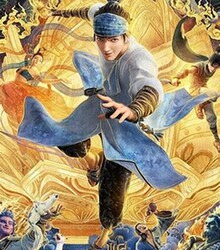
Okay!
So I know I made a post on Erlang Shen (Yang Jian is Erlang Shen's real name) and also a post on Chinese animation in general, but prior to both those posts getting made I'd never watched this movie. It was released August 2022 and is a "sequel" (not really, just set in the same cinematic universe) as New Gods Reborn: Ne Zha (which is NOT a good movie).
I mentioned in both the Erlang Shen and Chinese animation posts that the New Gods Reborn: Yang Jian movie is kind of mid. This was not an opinion I held, but rather an opinion I saw on a lot of review sites.
I finally caved and watched it.
Holy shit. It's so good.
Okay!!! Firstly, I see why people call it mid. For people who aren't Chinese (or Chinese people living abroad, or diaspora, or even Hong Kong/Taiwan people), the plot is very, very confusing. It requires a somewhat in-depth understanding of the myths of Erlang Shen and the Magical Lotus Lantern.
Luckily, I've made that post for you! Linked here. As long as you read this post you'll generally understand the movie.
There are some major characters that appear (this doesn't really count as spoilers I think? Since I won't tell you what they do or why) like the Four Heavenly Kings. I haven't made a post on this, but essentially they're important figures in Chinese Buddhism.
Without knowledge on these Kings (most Chinese will recognise them, they're very iconic figures), the audience will be confused as to why they're here and who they are.
I will probably make a post on them at some point. Stay tuned.
It also requires knowledge of some other scattered myths, most of which are widely accessible to people who grew up in China, but are utterly unfamiliar to everyone else. So for a wider international audience, it's not a good choice.
But for me, who does know all the references it's making (and consequrently, when someone in the movie is lying because I know the original myth), it's a very good movie.
First off: the animation is absolutely fucking gorgeous. Without spoiling too much, there's a scene in which the entire movie goes from 3d animation to 2d animation to reflect being within a painting.
(I don't think I mentioned this in my weapons post, or maybe I did, but the 山河社稷图 Divine Mountains and Rivers Painting or the 太极图 Taiji Painting is a mythical painting which can trap anyone inside it.)
It's absolutely breathtaking.
The most impactful parts of the movie involve Yang Jian (Erlang Shen) awakening his Heavenly Eye, or Tianyan. This may look just cool to outsiders, but in China, Erlang Shen is one of the most powerful deities of all time.
He's on a whole different level. He's incredibly OP, basically- maybe even stronger than Sun Wukong. What this means is that when he is at his full power, practically no one can stop him.
The plot is still kind of weird- I wouldn't call the story the main attraction. The story is a little all over the place, and the plot itself has some major flaws, but the beauty of this movie is undoubtedly the character design.
Not only are the models very well-done, but every single character is well-fleshed out. Everyone is sympathetic (except for the villains, I guess). Yang Jian is the main character, and his personality and motivations are not only likeable but understandable. But neither is he perfect all the time. He feels real.
Even for the side characters, their arcs feel very well-rounded. So the overall plot is kind of bad, but each character's journey feels well-done.
Regardless of these flaws, I'd recommend anyone who wants to get some insight into Chinese culture or mythology watch this movie. It was very, very impactful and also quite entertaining.
What I will applaud though, is the sheer spectacle, scale and beauty of this movie. First off, the models are very well-made. This movie wasn't exactly indie the same way Ne Zha 1 and 2 were since the studio behind them was big, but animation never quite reaches the same expectations.
I was honestly a little blown away by the quality of the animation. It's much, much better than I was expecting. I'm not saying it's Oscar-winning (although after watching Godzilla Minus One win the Oscar for best visual effects, I'm inclined to believe differently- those effects were terrible) but it's very, very good.
Most importantly, it feels unequivocally Chinese. The 2D ink-painting style that appears, the unapologetic references to Chinese mythology- it is very much a movie not at ALL made for international audiences. It expects you to know. It's only for the mainland Chinese.
Does this make the movie worse or better? I honestly don't know. In terms of pros, it doesn't waste time explaining the myths. In terms of cons, literally no one who's not Chinese can understand the full scale of this movie.
Is it as good as Ne Zha 2? Probably not- that movie is still so good, I've seen it multiple times in theatres. It's definitely as good as Ne Zha 1, if not better. It's WAY better than New Gods Reborn: Ne Zha. After enjoying Yang Jian more than I expected, I sat down and forced myself to watch New Gods Reborn: Ne Zha.
My goodness. Don't watch it, I'm being serious. The Yang Jian one is way better.
This movie, when it came out, was very big in China- not as big as Ne Zha 1/2 were, but big. Mainly because Yang Jian is HOT. Chenxiang (Yang Jian's nephew) is also hot, and the female main character (I won't spoil but you'll know) is ALSO HOT.
The main joke I see on DY and XHS is the scriptwriters should be carrying the animators and modellers to work everyday on a handheld sedan, because of how good the animation is and how mid the story is.
In essence- if you're Chinese or have a good understanding of Chinese mythology, this movie will be absolutely amazing IF and ONLY IF you manage to suspend disbelief for the entire time and pretend you have no critical brain. If you DO find yourself thinking critically, the plot will make 3/10 sense but it'll still be a good movie.
If you're not Chinese or have a very basic understanding of Chinese mythology, you can still watch this movie! Just follow these steps so you won't be confused ASF:
Read my Yang Jian/ Erlang Shen post (ehehe self promo). Seriously, though. If not my post, then at least read the Wikipedia page for the Magical Lotus Lantern and Erlang Shen. You'll be incredibly confused if not.
Read up on the Four Heavenly Kings. I don't have a post for this regrettably, and the Wikipedia page is unhelpful and I doubt linking a Chinese source will help. There are probably blog posts from other people on this, though- some Googling will probably be enough.
I've explained the Taiji Painting here and the Magical Lotus Lantern in the Erlang Shen post, but I recommend doing a bit more reading on the Magical Lotus Lantern anyway.
OKAY! Now onto my discussion of the plot itself. Beware: there are spoilers, so if you don't mind, read, but if you DO mind, you can come back after you've watched it. I'm not going to lie, spoilers don't really matter since there's no plot twists that are SUPER impactful, but be wary, I guess.
At the beginning of the film, the setting is in a pseudo-cyberpunk post-apocalyptic world, in which Yang Jian has had his heavenly eye sealed. I don't mind this at all- it's just that even without his heavenly eye, Yang Jian is still incredibly powerful.
It's not like he's weak in the movie- he does incredibly well, and is still an extremely talented fighter. But all the enemies he comes up against should still be easy pickings for him, to the point where he should just be smiting them with a flick of his finger. He shouldn't really be struggling at all, to be honest. For story purposes, though, this isn't that important.
They make up a backstory for Chenxiang and Yang Jian that makes Yang Jian not the cold ruthless warrior he is in the original myth. Instead of trapping his little sister (Chenxiang's mother) under the mountain for marrying a mortal man, instead their whole family is the victim of a generational bullshit curse where the mothers are forced to sacrifice themselves to seal off a mountain (in order to keep monsters and demons trapped underneath) and the sons are fated to split open the mountain to save their mother, thus releasing the monsters and dooming the next generation of women to sacrifice again.
It IS acknowledged in the movie that this curse is bullshit, and that it's simply the whims of powerful people sacrificing women (yes, the misogyny aspect is also acknowledged) to keep themselves safe. I like that they acknowledged this, and that everyone agrees this is bullshit.
I do also like that Yang Jian is much more relatable and agreeable in this film. However.
In the original myth, he is ruthless and cold-blooded- that's what makes him so well respected. In this version, he loses some of that gravitas. Don't get me wrong, he still has a lot of "aura", but... he loses some of what makes Erlang Shen so terrifying- that pseudo-sadistic, I don't give a shit attitude.
Also, during his time being trapped inside his painting, he's forced to go through a series of terrifying hallucinations. Not only do these hallucinations confuse HIM, they also confuse US, the audience.
Usually when this sort of stuff happens we're aware that he's the one hallucinating, but the animators leaned a little too heavily into it that I was just like "what the fuck" the whole time. I get that it's for immersion purposes, but they could've dialed the whole thing back just a little.
Also... Shen Gongbao's character is... strange, to say the least. He has literally nothing to do with Erlang Shen/Yang Jian or Chenxiang in the original myth, so him appearing out of nowhere is SO confusing. He could've just been replaced with someone else, like Sun Wukong (who's Chenxiang's teacher originally).
I get that they had to kill Shen Gongbao for plot reasons and Sun Wukong wouldn't have died so easily, but I feel like there's ways around that.
The villain's motivations also feel kind of weird. Like...what? None of what you're trying to do makes any sense.
MAJOR SPOILER:
Yuding Zhenren (Master Yuding, Yang Jian's teacher) being the big villain also makes no sense. Like, he can be the villain, sure, but he needs to have some proper motivations. Wuliang Xianwen (Master Wuliang in Ne Zha 2) being the villain wasn't a bad choice because his motivations were clear- make the Chan Sect more dominant.
But WTF is Yuding Zhenren trying to get at? I have no idea.
Additionally... there are parts of the movie that just don't need to be there. Like Yang Jian getting put in jail, for example. I know it's for cool purposes, but huh?? Their explanation of the Magical Lotus Lantern also felt very meh, like just "ignore the details and believe".
ALSO! I love their take on the Howling Celestial Dog (Xiaotian Quan 啸天犬). She's so cute and so funny and SO doglike without being gimmicky or weak! Additionally she also doesn't feel like "waifubait", which is somewhat important to me. (I'm not usually against waifubait, as a woman who loves women, but.... not sure Xiaotian Quan is the best option for that).
I like this movie a lot- it's definitely going on my "watch in the background while I do other things" list, which is a pretty high honour for me, at least. I do wish I'd seen it in theatres, but if it reran in theatres I probably wouldn't go watch it, just because the plot isn't that good.
In my opinion, one of the major flaws of Chinese animated movies is the storytelling. The animation is usually very good, but the story sometimes suffers. Even with my favourite Chinese animated movie, Ne Zha 2, there are noticeable plot points that I found myself wrinkling my brow at on my second/third watch.
I might outline that in a different post.
This was the case for New Gods Reborn: Yang Jian. It was also the problem with 30,000 Miles from Chang'an (which had a beautiful soundtrack and was very touching but the overarching story was meh) as well as Deep Sea, which again, had gorgeous animation and a touching story but the OVERALL plot is just okay (not bad! Just not amazing).
In my personal experience, Chinese animated movies (and Chinese movies in general) do either great visuals or great storytelling. Usually Chinese movies are GREAT at getting you to cry- the saddest movies I've EVER watched are Chinese- but once you've let a few days go by between the initial emotions and the initial hype you find yourself wondering "why"?
I will probably do a list of my favourite NON animated Chinese movies. In recent years, quite a few have been absolutely incredible, in terms of both plot and emotion. The Oscars are bullshit, we all know, and I've never expected any of these films to even get nominated, but if the Academy was fair I think each of these movies deserves at the VERY least a nomination. That's coming either today or tomorrow.
#chinese animation#chinese culture#ancient china#chinese#chinese mythology#erlang shen#yang jian#journey to the west#fsyy#investiture of the gods
21 notes
·
View notes
Note
Have you heard of/played the game "1000xRESIST" ? Fitgirl has it. I am super curious about your take on it, the politics especially. Have a great day!
I haven't. From a cursory glance, 'game from Vancouver, Canada, about diaspora intergenerational trauma and the Hong Kong protests' doesn't sound like a good start, but again, I haven't played it.
20 notes
·
View notes
Text
@eusuchia i saw this and this post recently on arundhati roy's the god of small things and learned about the term mango lit and diaspora lit, went down the op's posts on diaspora (via search bar) and found this article that i just finished and it's very very interesting (and so many links to further reading!)
and my own long ass diaspora thoughts under the cut.
caveat that i have not read much on these topics, these are all just disjointed thoughts in my head on chinese diaspora politics:
re: politics and marxism (i use the latter word very lightly bc i have not started on the theory at all) in relation to hk and china, and going back to the whole yellow/blue dichotomy
like you have hk ppl immigrating to the uk, and of course ppl who are able to immigrate have a certain financial background but even then there are differences - e.g. a banker or lawyer working in hk immigrates to uk with their kids because they want to leave the current political climate + better education for their kids (see: national education controversy). they get an equivalent banker/lawyer job in the uk and it's all good and they visit hk twice a year. vs say a low/mid-tier government worker who moves w their family to uk (also for kids' education reasons) and cannot find a job or has to "settle" for a customer service/retail/f&b job. and you have the people back in hk who say re: the latter, "well they were better off staying in hk!" and of course some of these ppl are very "blue"/pro-gvt/ccp-aligned.
and then continuing that discourse you have ppl back in hk talking about how canada/uk are slowly failing (transit system, high grocery prices, monopolies, nhs) and how these countries + certain places in the us that have a lot of hk/cantonese/chinese (san francisco, seattle, new york, houston) are very dangerous bc of a decrease of public order (unhoused, crime levels, drug use). seriously the number of times i have heard ppl say "isn't the 治安 so bad in x/y/z“ in the past 2 years. (fun fact if you didn't know but marijuana is considered as dangerous as heroin in hk and the psas treat it as such which is very funny)
and yes i agree there are many issues in canada (can't speak for uk obviously) w housing, transit, high cost of living, monopolies, healthcare etc but the solution to that (imo) is shifting to the left, right? but the hk people who immigrate here (mostly yellow) or have been here for decades (mostly blue) all tend towards the conservative party because of money (less tax, better business) and "family values". i've been thinking about it recently and imo yellow encompasses the liberal and neoliberal pro-democracy pro-western values pro-free speech thinking (and yes lgbtq rights to some extent, like i think the majority of lgbtq ppl and ppl in artsy/film/creative fields (much overlap) consider themselves to be yellow) and leans younger (40s and below), while blue encompasses conservative pro-ccp pro-gvt (beijing though tbh it could mean hk) pro-police and leans older. at the same time the blue side is somewhat pro-business (despite ostensibly being pro-left) because a big thing about the 2019 protests is that it was bad for business (basically wtf are they stirring this shit up for. tourists are leaving and profits are down etc).
and so the blue side "won" and now the hk gvt has essentially gotten rid of most opposition (either arrested, jailed or left hk) and technically since beijing is communist (though of course has shifted to capitalism etc) they should be improving hk, which has many many issues (housing: least affordable in the world by far, many social welfare issues (underfunded and understaffed as per usual), massive income inequality, labour issues (see: recent spate of construction worker deaths), ppl extremely normalised to working 9 to 7).
however, hk is essentially run by real estate tycoons, and most of the government's money comes from land sales (there is no sales tax. there's salary tax but you know. tax evasion) so if property developers are Not Happy they can all decide not to buy said land (recent SCMP article about this). currently (as of the past year) the property market has been Bad (this is a good thing bc homes get more affordable and ppl can buy) and will probably not do too well in the next 2-3 years (the local/global economy is not doing too well etc. idk much really about economics). anyway i'm curious to see to what extent the new gvt with its minimal opposition can actually improve in hk esp since it the city is basically capitalism incarnate (south korea too tbh).
my dad also said something very interesting to me about hk: he thinks that since china has "taken back" hong kong, it cannot let hk "fail" /decline as a city because that would make them lose face. so he thinks that hong kong will tend towards prosperity in the future.
sorry i just realised this was supposed to be about diaspora. i've been thinking abt the pushback from non-diaspora (sorry i hate using the word """The Motherland""") towards them (see below:)

(haven't watched this film but it does look interesting)
and thinking about the political leanings of chinese diaspora in general. i feel a lot of chinese diaspora are diaspora bc their parents left china when the ccp came into power (1950s), or left hk in the 1970s (leftist riots), 1980s-90s (imminent handover to ccp), 2020s (national security law) etc so their parents' politics will tend to be anticommunist. (idk enough to speak about immigrants from taiwan). and i guess to some extent that's how you end up with ppl who are either conservative or boba liberals.
been also thinking about the qiao collective (i think they were mostly on twitter which i was not on, but are now relatively inactive) which was made up of leftist diaspora chinese against sinophobia and came up against accusations of being tankies and pro-ccp (skimmed this article but it gives an overview of the qiao collective).
i think there's a false but encouraged conflation of china, the ccp, and communism (e.g. why are you communist but not pro-ccp, if you don't love china you aren't a patriot (and by 愛國 the speaker means the ccp), if you criticise the ccp you are being sinophobic etc etc) from both china and the west and it is all deeply frustrating.
and then of course you also have the everlasting discourse on uyghur governance in xinjiang (repression depending on who you talk to) that has been so muddied by fanatical and unquestioning coverage by the west and unquestioningly held up as the pinnacle of sinophobia and stated to be utterly false by some ppl on this site. which imo the latter idea seems deeply naive (see this post, unsourced but i think it is a better idea of what is actually happening there.)
and also the paradox of ppl from mainland china who move to canada but are still deeply pro-ccp (i am thinking of when pro-china and pro-hk ppl clashed during overseas protests in 2019) but to be fair this is not a really good argument because it can be applied to basically everything...perhaps a similar parallel would be british muslims protesting lgbt and sex education outside uk schools.
sidenote recently i saw a pro-ccp chinese diaspora person on tumblr mention they wanted to move to taiwan. and i do wonder what the thinking is behind that (see: military exercises around the island, the spectre of imminent invasion of taiwan etc) even though i do understand the wanting to move to taiwan.
long ass reply. and of course all of these thoughts are open to criticism
having some thoughts abt chinese diaspora lately (i am not diaspora btw. i think). if anyone has recommended readings please share
6 notes
·
View notes
Text
#Lausan Collective#activism#leftism#China#Hong Kong#diaspora#solidarity#progressivism#decolonization#feminism#social justice#politics#antiauthoritarian#radical left#racial justice#exploitation#capitalism#colonialism#imperialism#neoliberalism
4 notes
·
View notes
Text
翠絲 | Tracey (2018)
I wrote out all this on Letterboxd as my movie review, but wanted to share these thoughts here too, so here we are.
I think people dismissing this movie simply because "Oh, they can do better" don't realize that being able to say that is a privilege.
Is the execution perfect? No. But did it do a hell of a lot right, and with decent intentions? Yes. Do I think it deserves to be discussed when we talk about Hong Kong queer cinema today? Also yes.
I got curious about this movie after hearing Ng Siu-hin bring it up in interviews, but I didn't know a lot about it going in. I had expected the main narrative of a long-closeted trans woman eventually coming out to her spouse and kids, and that that journey would not be an easy one, but this movie ends up being about so much more than that. Beyond looking at the social and personal struggles of transitioning gender, it also addresses subjects like marriage equality, the perceived rights/wrongs of divorce, reproductive freedoms, generational divides, and multiple different outsider viewpoints on queerness (I was especially impressed with the characterization of the protagonist's son, who advocates for equality and acceptance on many different social issues throughout the movie, but backs down once one of them comes to affect his own life personally).
All of this is looked at in relationship with the structure of the Confucian family unit, and the insistence on saving face for the sake of the collective in Chinese culture, and how all of these things interact with and impact one another. It allowed for nuance and compassion for all characters, and the conflicts where no one was necessarily in the wrong were all allowed room to sit as they were. Many of those felt very accurate.
In addition, it was absolutely beautiful to see this movie focus on and celebrate those who only came out later in life, for any number of reasons— at 50 years old, at 70-80 years old. I say this as someone who is Gen Z and grew up in a good bit more accepting environment. It is never too late to take any step towards trying to be yourself. It is never too late to forgive yourself, either. (Speaking of those parts of the movie and their relevant characters, I additionally appreciated the further acknowledgment of Chinese/Cantonese opera and its intersection with queerness. That, again, was wonderful to see.)
There are some things here that I found relatable with my own experiences, that I've never seen addressed onscreen. I'm not out to any of my extended family, including the side that's in Hong Kong. I don't know if I ever will be. This movie portrayed some of the struggle and nuance that goes into wondering whether to take that step or not, and it's a kind that I've found many other queer people in the West who aren't also immigrant diaspora fail to grasp. "They could have done better", sure, that's true, and maybe eventually there will be Hong Kong films that can say they *did* do better. But for those of us who have lived/witnessd the same or similar experiences as some characters, 《翠絲》 does so very much already. I think it's an important film for Hong Kong to have today.
(Last note: shoutout to River Huang, whose performance marks him the scene-stealer of the movie in my eyes. He did a stellar and heartbreaking job playing a young writer grieving his recently-lost husband and all the dreams they shared together with him. I didn't know his arc would be in this film at all but I found myself the most emotional about the story during some of his scenes.)
17 notes
·
View notes
Text
I just played 1000xRESIST.
My first thought was "oh this has vaguely breathy voice acting with oodles of weight this is my shit" Shortly later I assumed "ooh I'm playing a smol gay girl from Hong Kong that's cool" This was followed by "oh no I'm actually playing a lightly terrible teen from Hong Kong, complex!" Then I began to understand "...I'm playing a clone who is witnessing the life of a lightly terrible teen?" "The teen has issues?" "There's a cycle of issues, oh no" "oh." "oh." "Oh!" Then it was "oh"s all the way down for about 12 more hours with a fair bit of weeping and sobbing and some very undignified noises
I'm trying to recommend this game but I'm fucking sucking at it because it's 10am and I've spent the last 16 straight hours playing the entirety of this game and every part of my body woke up during the credits and started screaming at me
And this is NOT a good state to be in as far as wording good enough to describe the themes in this fucking game. If you like:
Exploring the cycle of violence and abuse and the desolation caused therein
Exploring the end of the world
The last 2 episodes of Evangelion
Grief and Loss on scales personal and unimaginable
Explorations of immortality
What it means to experience Time and Memory non-linearly
Alternate ways of existing in a temporal space
Alien understandings of Life
Consequences
Love
Explorations of childhood
Coming of age stories
Stories about Asian Diaspora
or Sobbing and Crying
Then you should play this fucking game holy fucking balls I can't recommend it enough.
#1000xRESIST#this should probably be formatted better and written better and I've missed themes FOR SURE#but I'm very tired and I just finished and I'm at the “staring at the wall and trying to process” phase#because this is a piece of media that has a “staring at the wall and trying to process” phase#which honestly is the bigges recommendation I can give it#“Staring at the wall and trying to process what I just felt”/10
35 notes
·
View notes
Text
ATLA Modern AU: Avatar Edition
This is going to be a slightly different post. I don't think people ever consider the past Avatars in an AU set in a modern setting. Where do you think they would come from, if they had IRL nationalities?
For sake of simplicity, let's say the AU takes place in the United States, since most ATLA Modern AU fics I've read take place there, mostly in the San Francisco Bay Area. We could also use NYC as the setting, since Republic City is roughly based on 1920's Manhattan. I think this task would be much easier if we consider the real-life influences for each of the four nations. I'll be using this post as a reference for these influences.
For example, the Air Nomads are based off of Tibetan Buddhists with some Nepalese and Bhutanese influences, so it would be pretty obvious to make Aang Tibetan in a Modern AU. The same would also go for Yangchen, although I would personally prefer Bhutanese or Sikkimese Yangchen because the Western Air Temple (I'm not talking about the episode) is inspired by Bhutanese cliffside temples. Another option would be making both Aang and Yangchen part of a Tibetan diaspora living in India. Kyoshi, being half-Air Nomad, would also be of Tibetan ancestry.
The Fire Nation is inspired by a combination of Chinese and Japanese cultures, while Ember Island being inspired by Southeast Asian, mostly Thai and Cambodian culture. In a Modern AU, I can see Roku being Thai, while Wan and Szeto would most likely be Chinese, Szeto is from Hong Kong/Macau. I also have a particular desire for Korean Wan, for no other reason than the fact that his VA, Steven Yeun, is Korean. I also wouldn't mind Wan being part of a Chinese diaspora from Malaysia or Singapore.
The Earth Kingdom, being the largest and most diverse of the four nations, is inspired by many Chinese dynasties, various ethnic minority groups in China, and even other Asian cultures altogether. However, we'll be paying attention to one specific cultural influence in Kyoshi's appearance: Heian/Edo Japan. She wears samurai gear and kabuki makeup. How in the name of the Moon Spirit am I not supposed to make Kyoshi Japanese (half-Japanese, anyway)? Kyoshi Island, formerly known as Yokoya, is literally ATLA's equivalent to Japan in the real world. There are even Ainu influences in Kyoshi Island, what with the clothing of the people in Suki's village.
The last nation is the Water Tribes, and the last two Avatars left are Kuruk and Korra. Now, the Water Tribes actually have a more diverse range of cultural influences than what we might expect. According to both @atlaculture and @kkachi95, the SWT is based on Inuit, Yupik and other First Nation peoples, with some Polynesian influences as well. The NWT, in addition to these influences, is also influenced by Mongolian and Siberian peoples. Since Kuruk is from the NWT, in a Modern AU, he would probably be Siberian, mostly Yakut, but I wouldn't mind Mongolian Kuruk either. For Korra, since she is half-NWT and half-SWT, I think she would be mixed like Kyoshi, except Korra would probably be half-Inuit, half-Yupik. I also want Kuruk and Korra to be part of a Mongolian or Central Asian diaspora living in Russia (I'll admit, I'm only saying this because I really want them to speak Russian), but that probably wouldn't work due to the differences in their cultures in-universe.
I have an idea for a Modern AU involving the Avatars, as well as their backstories for said AU, but that's for another time. For now, I turn this question over to you guys, and I want to know your thoughts on my nationality headcanons.
#atla#atla modern au#past avatars#aang#yangchen#roku#wan#szeto#kyoshi#kuruk#korra#atla headcanons#mah rambles#imagine this
131 notes
·
View notes
Text
Asian Sophie fancast! ✨
I literally drafted this post a week ago and with the news of the potential Sophie casting call I feel like it was a sign to share my thoughts 😊
—————————
This is all for fun and as Sophie’s arrival seems to be getting closer and more inevitable, so here are some of my Sophie fancasts! As a SEA woman I would love to see representation in the Bton universe and have always pictured Sophie as Asian. [EDIT] With the assumed confirmation that Sophie will be East Asian I’ve included actresses that I love and have been fancast of mine for some time; these actresses are all East Asian (chosen before the casting call) but I also want to call to attention the lack of non-East Asian representation we see at this time. Fancast are at the end!
This is a good time to bring up what Asian representation even looks like since the continent is so big! I will be referencing this Variety article.
So we’ve seen that Asian representation has had a “significant increase of Asian characters from 3% to 16% over the course of 2007 to 2022” and while that seems like a step in the right direction it’s clear that the entirety of Asia is still not represented in media.
The release of 2018’s Crazy Rich Asians saw the increase of Asian stories and characters; but only “90% of the most visible of Asian characters on streaming platforms were a light or medium complexion”. Right now Asian representation is mainly centered around East Asians, and while any representation is good it’s important to be knowledgeable that not all Asian people are descended from that area.
There is a large disparity on how we view the term “Asian”. There are so many ethnicities that are beautiful and deserve representation. A larger representation needs to be seen within the Asian diaspora and also mindfulness to avoid common tropes and stereotypes is extremely important.
Any ways, here are some of my favorite fancasts I have right now! Conveniently all of these actresses are mixed race and with the obvious fact that Lady Cowper’s name is Araminta, it’s assumed Sophie is somehow related to them (which is a choice I do not agree with if now that Sophie is casted as a POC).

Natasha Liu Bordizzo (29)
Known for: Ashoka, Crouching Tiger, Hidden Dragon: Sword of Destiny, The Voyeurs
Ethnicity: Born in Australia, Chinese/Italian
Netflix connection: Crouching Tiger, Hidden Dragon: Sword of Destiny, Wish Dragon, The Society
Obviously Natasha is busy with her Star Wars projects but she’s been a longtime Sophie face claim for me!

Havana Rose Liu (26)
Known for: Bottoms
Ethnicity: Born in the USA, Chinese/White
Netflix connection: The Chair
The whole time I was watching BOTTOMS I was just so mesmerized by her beauty! She has this ethereal gracefulness that really makes me think of Sophie!

Adeline Rudolph (29)
Known for: Chilling Adventures of Sabrina, Resident Evil
Ethnicity: Born in Hong Kong, Korean/German
Netflix connection: Chilling Adventures of Sabrina, Resident Evil
Adeline always caught my attention in CAOS and I wanted to see more of her! She also has quite a bit of projects lined up rn but I’ve loved using her in some edits!
35 notes
·
View notes